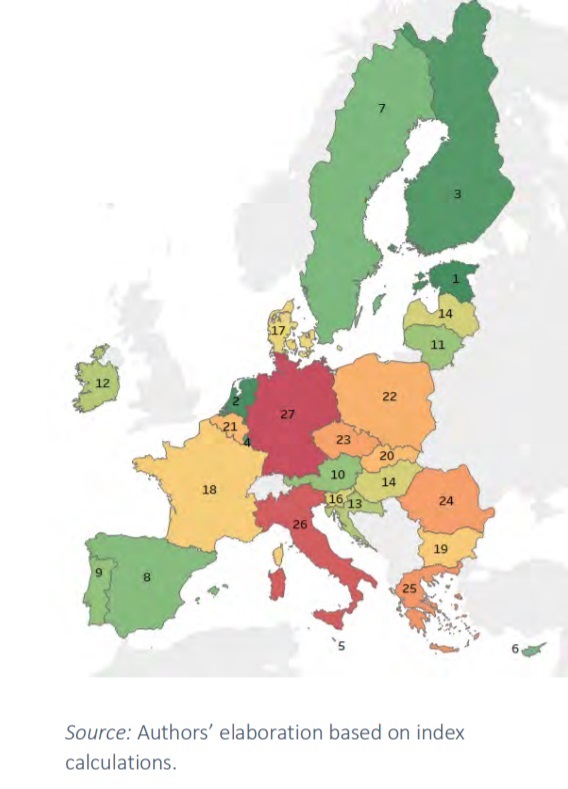Education and Science, Estonia, EU – Baltic States, Good for Business, Internet
International Internet Magazine. Baltic States news & analytics
Friday, 26.04.2024, 09:46
Estonia ranks 1st in Europe in terms of readiness for digital lifelong learning
 Print version
Print versionThe report compiled by CEPS in partnership with Grow with
Google was introduced at the Information Technology Foundation for
Education (HITSA) on Wednesday. The center's index of readiness for digital
lifelong leaning gives an overview of the ways how residents in different
European states improve their skills with digital technologies. The study
measured learning outcomes, digital infrastructure and policies as well as
people's attitudes towards digital learning in 27 member states of the
EU.
Figure 1. Overall results of digital learning index in EU-27

The top three positions in the list of 27 states are held by
Estonia, the Netherlands and Finland, all of which boast a high level of
computer literacy and a strong government policy encouraging digital learning
and the use of digital solutions.
"Estonia in particular has launched a number of
ambitious programs to ease administrative burdens, and make everything from tax
registration to voting possible via digital means. Estonia's leadership shows
that even a small country with a chequered history can lead Europe. While the
small Baltic states has much to teach to Europe, however, even the European
leader has room for improvement," a press release by CEPS reads.
Countries significantly underperforming the European average
are Belgium in the 21st place, Poland, 22nd, the Czech Republic, 23rd, Romania,
24th, Greece, 25th, Italy, 26th, and Germany, 27th. According to the report,
these results are indicative of the governments' limited policies in
promoting digital literacy and the complexity of access to digital resources in
these states. Germany has come under scrutiny for under-investment in digital
infrastructure, low internet connection speeds, and a lack of broadband access
throughout its territory.
"Digital education is our future. This index should be
a wake-up call to the states that are lagging behind in this trend. What's
similar about Italy and Germany? Both have strong manufacturing industries, and
both are weak in terms of digital learning. Leaders of [these states] should
learn from their faster and more future-oriented small partners in the
EU," director of CEPS Daniel Gros said.
"We want for all Europeans to understand and benefit
from technology. A comprehensive digital learning strategy is the pillar of
this ambition. This report shows how different states can learn from each other
and how businesses and governments can cooperate in building a digitally
capable Europe," Katerina Havrlant, marketing director at Grow with
Google, said.
Founded in Brussels in 1983, CEPS (Centre for European
Policy Studies) is an independent leading think tank on EU affairs with an
extensive network of partner institutions. As one of the few think tanks
in Brussels covering most European policy areas, CEPS offers exchanges and
provides insights on and potential solutions for EU policy-making.








 «The Baltic Course» Is Sold and Stays in Business!
«The Baltic Course» Is Sold and Stays in Business!

